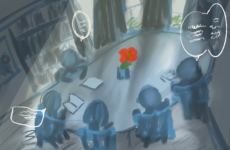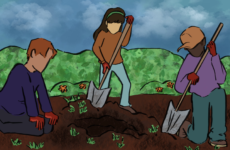Contrary to what you may have learned in physics, human nature negates the phrase “opposites attract.” In my experience, humans tend to build connections through the discovery of similarities that make them feel united. Typically, whether they find common ground regarding personal identifiers, experiences, or beliefs, humans feel more comfortable seeking agreement rather than dissent. For instance, when I started making friends, I immediately drifted to those who looked like I did.
Growing up in a community with lots of Asian Americans, I had never felt like a minority. There was no sense of oppression and no desire to assimilate to a mainstream culture that I wasn’t a part of. I became friends with the Lius, Wangs, and Zhaos instead of the Smiths, Jacobs, and Andersons. We talked about things we had in common, like the joy of having homemade dumplings for lunch or the stress of Saturday Chinese school. It was easy to consider these friends as “family” and believe our connection was authentic.
The idea of trying to befriend somebody who was different than me was a scary concept. Would taking that first step out of my usual friend bubble ultimately result in rejection anyway? Although I knew that their friendship would probably have much to offer me, I was unwilling to let myself be vulnerable. It was like playing poker: I had convinced myself that I would lose, so instead of betting more, I chose to fold and walk away.
This mentality stuck with me all the way up until I arrived at Choate. Coming in as a Pathways student, I was immediately made all too aware that I was part of a cultural minority. I didn’t fit in with the international Chinese students nor with the American Born Chinese students that grew up in big cities like New York or Chicago. The very first night, I checked the directory to see if there was anybody in my grade from the same state, a simple identifier I could start a conversation over: the answer was no.
Feeling lonely and lost, I was thrown into a hectic school environment. During the first few days, I stayed stuck in my old ways, cautiously sitting at lunch tables that had people I already knew. I could see friend groups starting to form, and I still didn’t see my place in any of them — I didn’t know how to start conversations with people with whom I had nothing in common.
Slowly, I came to the realization that my fear of being viewed as an outcast was unfounded, and that people who I may have never talked to before were willing to ask about my day. Choate, in fact, was not full of rude Draco Malfoys and snobby Blair Waldorfs.
In this welcoming community, I slowly found my people, too, that I’ve grown to trust. I have been able to form strong friendships with people that are from a diverse array of cultures. We may not share the same interests, classes, or identifiers, but learning about their ideas and values has brought us closer. I take them to get bubble tea at Vivi’s and explain why watching Chinese TV shows reminds me of home, while they share with me their experiences living on a different continent and describe to me their favorite homemade meal. They’ve helped me realize how limited my worldview was and how my own self-doubt has prevented me from gaining cultural competency. I’ve been able to develop an appreciation for cultures that I have never been exposed to before, and I am now better at empathizing with others and being able to listen and carefully consider perspectives different than mine.
However, I’m still learning and maturing. Even as a junior, there are classmates that I’ve never spoken to, but I am no longer unwilling to step out of my comfort zone. Although I celebrate little victories, like greeting somebody new on the path or sharing what feels like a bold opinion in class, I also still see people sitting with the same friends at lunch, walking to classes with the same group, and sitting at the same table in classes. I’m guilty of all these things, too.
Outside of Choate, the world is much more intimidating, making it difficult to challenge long-established biases, especially those enforced by people in power. Many times, all that I am strong enough to do is to make sure I don’t contribute to the normalization of discrimination. Although this is just a small step towards the right direction, it’s important to realize that if we were all willing to do it, then there would be no need for others to step up and herd society towards the direction of a more accepting world. As I take more leaps of faith and break down more of my personal barriers, I hope that others will, too, and that we can form deeper connections with those around us.




